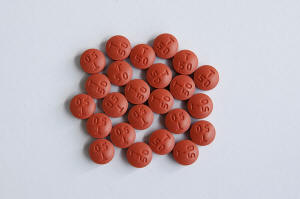WHO warns of growing resistance to GSK's HIV drug
 Send a link to a friend
Send a link to a friend
 [March 06, 2024]
(Reuters) -The World Health Organization (WHO) said on Tuesday
resistance to GSK's HIV drug dolutegravir has exceeded levels observed
during its trials, citing observational and survey data received from a
few countries. [March 06, 2024]
(Reuters) -The World Health Organization (WHO) said on Tuesday
resistance to GSK's HIV drug dolutegravir has exceeded levels observed
during its trials, citing observational and survey data received from a
few countries.
Resistance ranged from 3.9% to 8.6% and reached 19.6% among people who
have received and transitioned to a dolutegravir-containing
antiretroviral therapy (ART) regimen to combat high HIV viral loads.
HIV medicines reduce the amount of the virus in the body to a very low
level and helps prevent illness.
"The resistance analysis focuses on subgroups whose virus was not
suppressed and the data does not indicate that resistance was prevalent
in the overall population", a GSK spokesperson said on Tuesday.
The global health agency did not disclose the number of countries from
where the data was reported, but said only a few countries have reported
survey data to WHO, to date.
Only Haiti reported survey data to the WHO for HIV drug resistance among
infants who have not received the therapy or infants starting it.
The WHO said there have been cases of resistance to a class of HIV drugs
known as integrase-strand transfer inhibitors in patients who took the
injectible version of an HIV preventive drug called cabotegravir or
CAB-LA.
Cabotegravir, also made by GSK, is sold under the brand name Apretude.
[to top of second column]
|

Dolutegravir pills used in the treatment of HIV are seen at the
Kenyan ministry of heath offices in Nairobi, Kenya, June 27, 2017.
Picture taken June 27, 2017. REUTERS/Baz Ratner
 The WHO recommended that countries
routinely implement standardized surveillance of resistance to HIV
drugs, which could help understand the patterns of resistance among
people not achieving a suppressed viral load.
"We agree with the WHO that there is a need for further
surveillance," GSK said.
The agency has been recommending the use of dolutegravir as the
preferred first- and second-line HIV treatment for all population
groups since 2018.
It has recommended use of long-acting injectable cabotegravir as an
additional prevention for those at substantial risk of HIV infection
since 2022.
(Reporting by Sriparna Roy in Bengaluru; Editing by Arun Koyyur and
Shounak Dasgupta)
[© 2024 Thomson Reuters. All rights reserved.]This material may not be published,
broadcast, rewritten or redistributed.
Thompson Reuters is solely responsible for this content. |